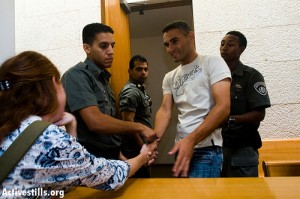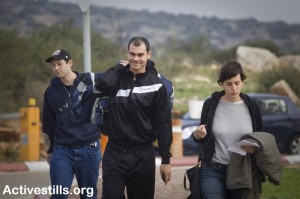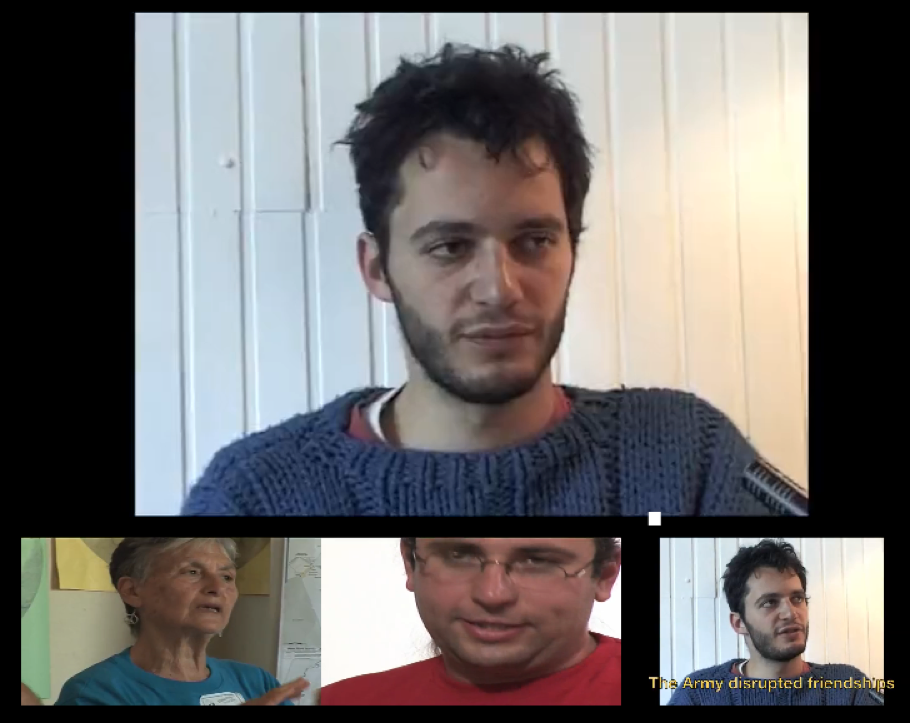The Only Democracy? » Discrimination, Featured » When My Partner Went to Jail
When My Partner Went to Jail

Me and Mousa in court.

Jonathan Pollak going to jail
Originally posted on Rajeefsworld.posterous.com
A lot has been written recently about my good friend Jonathan Pollak’s recent incarceration in Israel for his participation in demonstrations. Understandably, there was international outrage at his sentence—3 months for non-violent assembly. It made me reflect, however, on a totally different incarceration in my life, one that can only further illustrate the extent of Israel’s apartheid. Jonathan’s partner, activist Eilat Maoz, wrote a piece about walking Jonathan to prison, and the glimpse it gave her of the life of the families of other political prisoners. I also got a feel for that life, with one critical difference: my partner is Palestinian.
In December, 2007, I said goodbye to my then fiance (now husband), and left Palestine for a trip home to the United States. I hugged him goodbye in the streets of Jerusalem, where he had entered illegally to see me off. It was the last hug I gave him for a year and a half. I, too, was in a relationship with an activist, a man committed to justice and liberation. He just happened to be Palestinian.
I did not get to say goodbye to Mousa when he was imprisoned on April 11, 2008. I didn’t know he would be going to jail. He was held for 9 days without charge, before his lawyer (the same lawyer who represented Jonathan) was informed that he was going to be held in administrative detention. This meant that he would be imprisoned immediately and indefinitely. His court hearings were held in secret; none of his family (not even me, who holds Israeli ID) was allowed to attend. While Jonathan’s trial and sentencing were a farce of a civilian “democratic” legal system, Mousa’s was not even that. Hearings were held in secret at the prison in the middle of the Negev desert, evidence was presented without his lawyer being present. We spent months guessing what the Shabak might be accusing him of; we still don’t know for sure.
The only physical contact I had with Mousa was a handshake we sneaked at the end of his Supreme Court hearing in May, 2008, the only time he entered a civilian court, and the only hearing his supporters, and myself, were able to attend (his family, of course, were not even allowed to this, since it was held in Jerusalem).
In September, 2008, after just over 5 months in detention, Mousa’s detention was extended for another 5 months. When it became clear that he may spend years in jail, that there was no way to know when we’d be able to continue our lives together, we decided to marry so that I would be allowed to visit him. None of his siblings were given permits to travel into Israel by Red Cross buses, to visit him. His elderly father did receive clearance, and visited him for the first time after Mousa was in jail for three months (common for “security” detainees, who are not allowed contact with visitors or, oftentimes, lawyers, for the first three months of “investigation”). Mousa signed a power of attorney with the International Red Cross and empowered a member of his family to stand in for him in signing our marriage contract; we could not meet even for that.
I visited Mousa for the first (and what ended up being the only) time in December, 2008, a year after I said goodbye to him. As an Israeli ID-holder, I was afforded a few privileges my father-in-law was not. I got to choose where to board the Red Cross bus that takes families from all over the West Bank to visit the families of the nearly 3000 prisoners at Al-Naqab (Ketziot) prison. I chose the bus from Jerusalem, which left at 6am, rather than the one from Hebron, closer to my home and to the prison but leaving at 4:30am because of the time it took to get through the checkpoints. I couldn’t just drive up to the prison to visit. Palestinian prisoners are treated by the International Red Cross the same way prisoners of war are in many ways and visits are coordinated with the military prisons through them.
On the three hour trip down the coast and along Gaza (this was during “Operation Cast Lead” and the dozens of women on the bus looked anxiously at the horizon over Gaza, watching the jets and helicopters flying over), I made quick friends with two women who gave me a crash course on the process of the visit. The entire experience would take 10 hours (plus my 2 hour trip back and forth from our town in Hebron District) for a 45 minute visit. You had to pay close attention to the guards, who call out the names of the prisoners when it is their turn for a visit. I had not brought lunch, and the women, whose husbands, though from Jerusalem, were being held in Israeli military prison, gladly shared food with me.
As we entered the yard outside the visiting hall, I soon realized why this was an all-day affair. Visits were coordinated for several districts on the same day. Over 600 women and children (only a handful of men are given permits for these visits) filled a cement courtyard. I spent most of the next two hours pacing around the fenced-in area, trying to keep an ear out for my husband’s name.
My group was finally called and we went into an indoor holding area where we were strip-searched and led into another waiting area. One man asked me if he was allowed to wash his hands. I pointed him to the sinks, confusedly thinking that he didn’t know where he could wash up. When Mousa’s name was called and I walked through the maze to the visiting room, chuckles rose through the room. An older woman explained they had thought I was a guard, insisting, when I asked, that it was because of my navy-blue jacket, and not because of my light complexion. I sat across a window from Mousa for exactly 41 minutes. We talked about nothing through phones attached to the wall that made it sound like he was a million miles away. I scanned his face for evidence of the event even more horrific than his sudden incarceration—when he narrowly missed being shot in the head by an Israeli soldier in January, 2008 but was hit with shrapnel which cut his eye and head.
The visit was over too soon, and I lined up with the other women to gather our packages (another strange Palestinian tradition, since heads of households are so often in jail, they are allowed to buy gifts from the canteen and have them given to their visitors. Mousa bought me a big jug of my favorite cola and chocolate bars).
For the next 6 months I was prevented from visiting Mousa. His father visited once, and multiple visitors were not allowed, and on three other occasions the military decided he needed to be moved to court dates (sometimes days ahead of time) or other prisons on the days of visits.
The worst thing about administrative detention, even worse than the secret hearings and the security excuses for preventing visits, is the uncertainty of it all. As the day of his current term of imprisonment would approach, his entire family and I would wait, virtually holding our breath, to see if his attorney would be informed of the Shabak’s intention to extend his detention. For Mousa, it was even worse, as the guards would not tell him even when a decision was made. In early January, 2009, we received a phone call from another man in the village who’s relative was also in An-Naqab. Mousa had managed to pass on the message that he was being released. In total disbelief, I called his lawyer, who assured me that Mousa was not being released. But other prisoners had heard the guards telling him he was free, and watched him walk out with a bag of his belongings. His family slowly gathered at the house. Kids were scrubbed, food was prepared, and even though I thought the lawyer would know, I too put on a clean shirt and waited.
At around midnight, when it was clear that Mousa was not coming home that day, I received a call. On a smuggled phone Mousa told us that the guards had in fact told him he was being released, and went so far as to escort him to the gate of the prison, before essentially saying, “just kidding.” This final torture, giving him hope and then tearing it away, temporarily broke him. He agreed to be exiled-to stay out of Palestine for 3 years in exchange for his freedom. Again, hope was dangled in front of him—the prosecution agreed to the deportation, and he was taken to the bridge to Jordan. His father and I raced to meet him, I began making plans for a life in Jordan, or Dubai. After hours of waiting at the bridge terminal, he was put on the bus over to the Jordanians, and was able to sit with his father as they crossed (Israel would not allow me to cross over the same bridge, so I had to travel two hours north to the bridge to Jordan from the Galilee, where Israelis were allowed to cross). Minutes before I crossed into Jordan (I had already paid the tax for crossing, in fact) I received a phone call. Mousa told me to wait, he was not being allowed into Jordan. Jordanian officials said the Israeli government hadn’t coordinated the deportation with them, and he would not be allowed in. Once again, I thought I was hours away from seeing him again, only to be heartbroken.
I cannot imagine the ride back over the bridge, Mousa having to get off the bus and return to the prison guards. I know his father returned home broken. When Mousa and I spoke again he told me the shabak at the bridge terminal was very interested to know about this strange American girl with Israeli ID who had come all that way to see him. When told that I was his wife, they laughed, telling him no international girl would ever wait for him, and he should give up on ever having a life with me.
His family and I returned to waiting. In February, 2009, when the Shabak requested and received a third extension of his detention, another lawyer was able to get the court to reduce the time from 6 months to 4 months, and a commitment that it would not be renewed. Even with a court order indicating his day of release, we were not convinced. On June 14, 2009, the family once again began to gather at our house. We studiously discussed anything other than Mousa. Just after 5pm, I received a phone call.
“I’m free”. He said.
3 hours later he was home. He had been in jail for 14 months and 3 days. I hadn’t seen him free in over one and a half years.
When I read Eilat’s piece on Jonathan’s incarceration, I thought it would be a good idea to present the experience of the spouse of a Palestinian prisoner. I asked friends of mine in Beit Ommar why no one wrote an article for the newspaper about the experience of Palestinian wives of prisoners, and if they’d like me to help them write one in English. Everyone of them laughed. “Ya Bekah”, they said, “who would read it? It’s not news, it’s life.” The wife of a Popular Committee member in Beit Ommar asked me if I’d like to write something about how to cook chicken “the Palestinian way”; it would be more news-worthy.
My experience was entirely average for Palestinian women. It is estimated that over 90% of the Palestinian adult male population has been in prison, often several times (this was Mousa’s 3rd imprisonment). Palestinian women carry their households and maintain hope in the face of unbelievable odds. Even for the majority of Palestinians who are sentenced to fixed periods of time, their release is not a given (as is the case with two activists from Bil’in, who were detained after their release dates and had their detentions extended). Life in Occupied Palestine is marked by uncertainty. An entire society lives in limbo, never knowing when a family will be torn apart, and when it will be reunited.
There has been quite a bit of Israeli and international media attention around the imprisonment of Jonathan Pollak, as well as other signs of increased repression of left-wing Jews inside Israel. 10,000 people, some wearing stickers of Jonathan, marched in Tel Aviv against the Israeli Knesset’s plan to investigate Israeli human rights and other progressive organizations last month. Yossi Sarid, a former Israeli cabinet member and now journalist with Haaretz, wrote about a recent visit to Jonathan while in prison, lauding Jonathan’s commitment to justice and activism. The attention is well-deserved: Jonathan has been one of the most hard-working, dedicated activists I have ever known. And yet I can’t help but feel a little frustrated with all the attention his case has received. Israel didn’t ‘finally’ cross a line when it started oppressing Jews. Jonathan’s case should be used as a plum line, to measure just how racist, how undemocratic Israel really is. He is the worst there is of the unarmed variety of Israeli political activists (a designation he should be proud of), and he is getting a third of his sentence reduced for “good behavior”. No one should be held in prison, least of all for fighting the injustice of a state, but let’s not forget the greater outrage: how Israel treats the 4.5 million non-citizens, and 1 million more second-class citizens, under its control.
Filed under: Discrimination, Featured · Tags: israeli activist, israeli apartheid, Jonathan Pollak, mousa, palestinian prison system, prison








 “You have a choice! Israeli Anti-Militarists Speak”
“You have a choice! Israeli Anti-Militarists Speak”